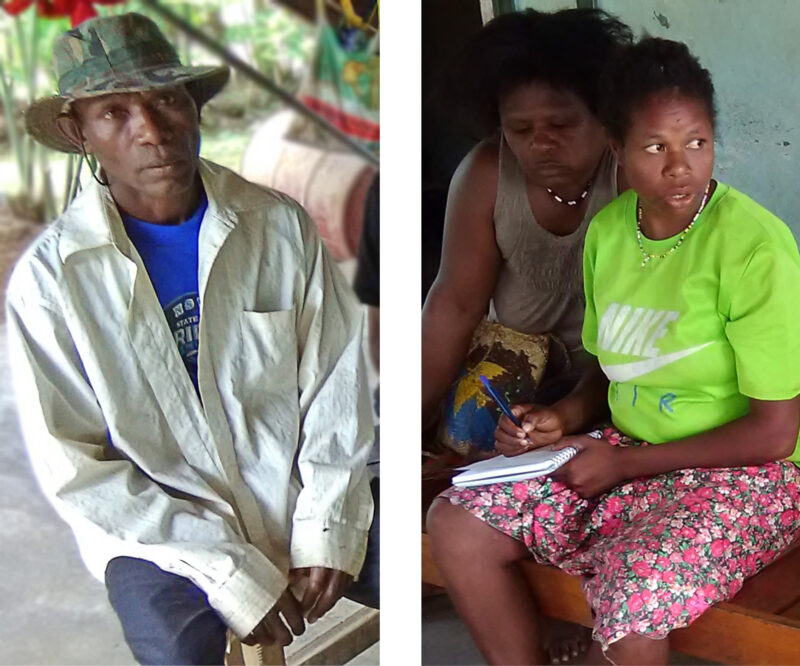ABM Archive Website
THIS WEBSITE CONTAINS ARCHIVE MATERIALS FOR HISTORICAL REFERENCE ONLY
For up-to-date information, including our latest appeals, news, and resources, please visit our current website.
ANGLICARE CHURCH PARTNERSHIP PROGRAM EVALUATION SUMMARY
A closer look at ABM’s Adult Literacy and Life Skills Project in Papua New Guinea*
Before attending Anglicare Papua New Guinea’s adult literacy classes, Salome had completed year 7 of formal schooling. Silvester had completed year 6 but then dropped out. Neither had learned to read or write through formal schooling but when Anglicare’s adult literacy program was extended to their village, Saksak in New Guinea Islands, they both seized the opportunity with both hands.

Left image: Silvester is using his newly acquired literacy and numeracy skills to start a fishing business.
Right Image: Literacy gave Salome greater confidence.
© Terry Russell, ABM, 2019.
Partner Anglicare Papua New Guinea, supported by the Anglican Church of Papua New Guinea
Period evaluated July 2016 – May 2019
Date of evaluation June 2019
ABM deployed an internal evaluator to conduct this evaluation. He was aided by ABM’s in-country liaison consultant and staff from Anglicare and all five Anglican dioceses, allowing data collection from dozens of remote communities right across Papua New Guinea (in fact, we gathered over 400 pages of field data, in addition to data from project staff themselves and from other stakeholders).
Project description
The project aimed to build the capacity of Anglicare and the Anglican Church adult literacy schools and related church services, as well as to increase community members’ literacy rates and opportunities to transition to formal education, livelihoods and employment across Papua New Guinea.
Some of the adult literacy schools also ran classes or ‘one-off trainings’ on life skills (like sewing and baking), disaster risk reduction, social issues including disability awareness, and health. The project also engaged with provincial and local government in joint awareness-raising about adult literacy, HIV-AIDS and gender.
The beneficiaries were clearly among the most disadvantaged. From a sample of 81 learners interviewed across all five dioceses in May 2019, almost half (44%) had zero formal schooling. Only 21% had more than six years of formal schooling.
Key results
- Anglicare Papua New Guinea’s Adult Literacy and Life Skills Program reached over 3,220 program participants during the period July 2016 to December 2018.
- By December 2018, the program had 74 Adult Literacy schools operating across 11 of the country’s 22 provinces.
- The program trained 350 teachers from July 2016-Dec 2018.
- Gender sensitisation sessions reached at least 706 men and women, as well as many hundreds more through integrating gender discussions into literacy classes.
- Child protection awareness-raising sessions reached 4,219 people in. In addition, 48 child protection cases were referred onto government services (police or family welfare department) and safe houses run by other organisations.
Key Impacts
- Increased participation in community and family life. Participants said they had begun reading shop signs, exchanging notes with their family members, engaging with their children’s schooling, sending and reading mobile phone text messages, and participating more actively in church services and other community events.
- Improved income and education opportunities. A large proportion of learners gained numeracy skills which enabled them to conduct trade activities more confidently. A small but significant proportion of learners also gained sufficient skills to proceed to formal education, open their own business, or gain waged employment.
For example, of the 60 learners who transited to formal education or employment during the second year of the project, 23 transitioned to vocational training (Minohana Vocational and Limana Vocational), 22 re-entered other formal education, 12 gained waged employment, and three started their own businesses.
- Improved gender awareness and women’s empowerment. Most learners were women. Out of the dozens of survey respondents who spoke about program impacts on women, virtually all agreed that opportunities for women in their communities had been enhanced.
- Other minor impacts. Some participants observed positive behavioural impacts arising from discussion sessions on health and social issues. Some teachers said teacher trainings had led to improvements in their classroom practice or record-keeping. Some participants had attended classes on sewing, baking, cooking and other life skills, and said they had continued to utilise these skills.
Recommendations
The evaluation identified that the program could be improved by increasing the level of support to teachers, including increasing training opportunities and increasing monitoring visits to schools.
The evaluation also recommended promoting the adult literacy program more widely and linking the adult literacy schools with local organisations that could assist with materials or training.
A third recommendation was to expand Anglicare’s Monitoring & Evaluation system, to include tracking the ratio of students and schools per diocesan staff member and having a target ratio; tracking the number of visits to each school per year (by diocesan, ABM or Anglicare head office staff) and what materials are distributed to each school; and tracking the different types of training received per diocese, who received training, and any follow-up of that training.
Short Case Study
And did Salome’s and Sylvester’s lives change at all after attending literacy classes? When asked about the biggest change in her life, Salome said, ‘Now I can talk to my peer group. Before, I was an observer. I didn’t feel free to talk’. Sylvester has become confident in reading Tok Pisin and said he has set his sights higher. His ambition is to buy a bigger boat and become a ‘fishing businessman’.

*This project was funded by generous donations from ABM’s supporters and through the Australian government’s Papua New Guinea Church Partnership Program.


